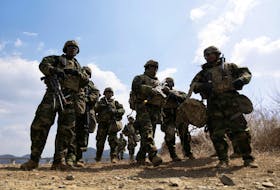BERWICK – Earl Dolsen drums his fingers – one-two-three, one-two-three, one-two-three – as he remembers his years serving as a musician with the Royal Canadian Air Force.
Dolsen is 96, and still plays his trumpet. He calls those 33 years “the best” of his life.
At 11 a.m., he says it’s still a few hours earlier than he normally starts playing but puts the instrument to his lips and launches into crisp rendition of The Last Post.
“Well, that went better than I thought it would have,” he says.

Dreams dashed, but not for long
Dolsen is a Second World War veteran, having served in the RCAF from 1942 to 1975. Hailing from a small prairie town in Saskatchewan called Strasbourg, Dolsen says he was first drawn to the air force because he wanted to “buzz” his relatives.
“If you went to school from 1939 to 1945, marks didn’t matter. You knew you’d become cannon fodder.”
Buzzing, as described by Dolsen, is the not-so-legal plane maneuver of making a nose-dive – which, Dolsen clarifies, comes with a buzzing sound, hence its name – over properties like houses and schools in his hometown.
“In those days, you weren’t supposed to do that, but people did it – and people knew it was you up in that plane,” says Dolsen.
He said buzzing, and hearing stories from soldiers who’d return home on leave and talk about their war stories, made him sure he wanted to join.
“But I promised my folks I’d finish Grade 12,” he says.
Dolsen enlisted when he was 19, but soon found he was unable to fly because he wore glasses, and didn’t fit the air force’s perfect vision requirement. So, it was back to the professional drawing board, and Dolsen didn’t know where he’d end up until an officer noticed something in his file – music.
“He pulled me aside, and he said, ‘so you played band in high school?’ So, I said ‘yes,’ and he handed me a bus ticket to the University of Regina to travel there and complete an assessment. I played for a teacher there, and passed,” says Dolsen.
Memories of a ‘core unit’ persist
He then spent the next 33 years – 1942 to 1975 – in various musical roles, including bandmaster, for various Royal Canadian Airforce bands across the country.
He was posted to towns across the country with his wife, Kay, and looks back fondly on their adventures together.
Dolsen played music all day, every day, and when he wasn’t performing, he was learning more. Despite having dreams set on flying, he says he found this posting nearly as exciting, and thrilling in different ways.
“Here I am at 19, playing in my school band, and next thing I know I’m on my way to Ottawa and that’s where the best band in Canada is – the Central Band Ottawa. I thought that was amazing,” he says.

Some of Dolsen’s fondest memories come from his time living on base in Ottawa while training with the Central Band, where anyone caught breaking rules or disobeying orders was made to shovel coal all weekend and report to normal duties bright and early Monday morning.
One night, a band member hung back at the mess hall where everyone had enjoyed a few beers and stole more alcohol from the sergeants’ hall. The member returned, woke up the entire barracks, and continued on his way.
In the morning, the military police arrived and interviewed each band member. Dolsen smiles, and says, “not a one of them cracked.”
“They interviewed everybody, and not one member of that 30-piece band gave anything away. To me, that’s really a core unit,” he says.
Landing in Nova Scotia, travelling the country
Dolsen and his wife first arrived in Dartmouth in 1945. He was present as Canadian troops returned from overseas, and says it was quite a sight.
“I was there when all of the troop ships were coming back in, and also when they were taking all the bombs out to sea on barges to bury,” he says.
Soon after, Dolsen was sent on tour across the country with veterans who’d served overseas – all to raise money for Canadian Victory Bonds. The tour took them all to cities large and small. He says it was exciting to be part of something “as big as that was.”
“That was interesting, because you’d get huge crowds – they all wanted to see a veteran, whether army, navy or air force,” he said.
He never served in Europe himself, and often thinks about other military members who didn’t serve overseas. He says while “many would not agree with him,” their contributions at home mattered, and also made a difference and contributed to the Allies’ victory in the war.

“I often think about the guys in the air force that trained the pilots, the navigators, the bombardiers – they never got any glory, but every day they flew they’d take a little risk with a student. To me, they were just as important as the student who ended up overseas,” he says.
“The fellas that served in Canada never got much credit – you had to be overseas for that. But the danger of teaching raw recruits really was tremendous. I respect that.”
Living through the war before enlisting
Dolsen vividly remembers living in the years leading up to and during the Second World War.
Before he enlisted, his family survived on rations including just two pounds of meat per week.
That amount was to feed his entire family, parents and siblings included. He now shudders thinking of the amount of meat in quarter-pounder burgers.
While on tour, Dolsen was invited to many dinners. He always hesitated eating larger portions because it made him feel guilty.
“I knew I was eating your rations. Could they afford feeding an extra mouth on the rations? I didn’t know,” he says.
He also remembers his Sunday school teacher, Mr. Borden, teaching kids how to use Morse keys to read and send messages. One day, at the telegraph station, the local kids heard a key and decoded it. It read, “If you understand this, report to Mr. Borden.”
Many of those who understood it went on to work at the telegraph station and interpret important messages during the war.
Mr. Borden, a station master himself, received telegrams reporting wounded and fallen soldiers. Dolsen says whenever people saw Borden carrying a yellow envelope, they knew a soldier had died.
“We always knew who it was because of the house Mr. Borden would carry the envelope to. It seemed normal, though – we knew full well many people would not return,” he says.
Dolsen says this is also why students of age to enlist would never put much effort into earning top grades in school, himself included.
They knew they’d receive an invitation to join the army once they turned 18, they had other priorities.
“If you went to school from 1939 to 1945, marks didn’t matter. You knew you’d become cannon fodder,” says Dolsen.

Fewer veterans year after year
Dolsen recalls a time when farmers, industry workers and others in Saskatchewan were approached by purchasers looking to buy their leftover iron.
In the years following the Great Depression, he says there wasn’t much to debate – money was scarce and opportunities to earn seemed even more rare – so people sold their metal without a second thought.
He says they later discovered most of the metal sold went straight to Germany.
“We didn’t realize it was an agent for Germany. And they bought a lot of the scrap iron in Canada and shipped it to Europe – it took a while for people to realize,” he says.
Dolsen says he’s reminded of how people can act without thinking at times, pointing the finger to the United States and the election of President Donald Trump nearly two years ago.
He says the only way another war will happen is if people don’t take the time to think such decisions through.
“I wish people in the U.S. would read Mein Kampf. It’s the same thing happening down there, and I don’t like it one bit,” says Dolsen.
The veteran now spends much of his time playing trumpet for school and community Remembrance Day-related events, which he’s seen a change in over the years.
“There are huge crowds now. I think people are more aware of what the guys, regardless of where they served, did when they served, but the crowds grow larger every year,” he says.
Dolsen also plays the trumpet at other veterans’ funeral services.
He drums his fingers again – one-two-three, one-two-three, one-two-three – as he talks about what it means to remember, as the number of remaining veterans shrinks.
“I’m 96. I’ve lived a long life, and I’ve seen many changes. This change is very noticeable – there may be only five or six of us for Second World War vets remaining here,” he says.
“So, it’s nice that people come out to remember.”
Read more on our Remembrance Day series:








